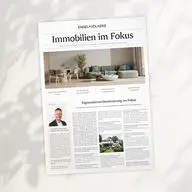
Sell successfully with Engel & Völkers
It's promising: Our worldwide network of earmarked prospective buyers.

Selling a house or an apartment involves costs—even if you sell the property without the support of a real estate agent. This is because certain expenses, such as notary fees or the real estate transfer tax, must always be taken into account. However, there is no nationwide regulation in Switzerland: the amount of fees and taxes varies greatly from canton to canton. You can find out which costs are incurred when selling a home and how high they are below.
If you would like to entrust the sale of your property to experts, a real estate agent’s commission will apply. The amount is always negotiable; there is no legal regulation. In addition to the agreed commission based on the sale price, further marketing costs may be added and billed by the agent. These may include home staging, listings, or high-quality photos and drone footage for the sales brochure.
Tip: Clearly define the amount of the commission and the duties the agent is to perform (and may charge for) in the brokerage agreement.
Ultimately, after a successful sale, the agent’s commission can quickly amount to several tens of thousands of Swiss francs. Although many sellers are hesitant about these costs, they can often recoup the amount in the end.
Thanks to their in-depth knowledge of the local market, experience in real estate sales, and expertise in optimal marketing strategies, agents are often able to achieve a higher sale price for the property.
In addition, sellers benefit from the fact that specialized agents have a large network of potential buyers to whom they can offer the property. This often shortens the selling period. Last but not least, sellers save a great deal of time and organizational effort associated with a sale—such as arranging and conducting property viewings.
In Switzerland, real estate prices have essentially only gone in one direction: up. This is generally good news for sellers, but it also means that a higher real estate gains tax is due upon sale. This tax is, by its nature, borne entirely by the seller.
The basis for calculating the tax is the difference between the purchase price (including all value-enhancing investments) and the sale price, minus selling costs such as agent commissions or the real estate transfer tax.
The rate of the real estate gains tax varies depending on the canton, the length of time between purchase and sale, and the increase in value of the property. Most cantons apply a progressive tax rate—the higher the gain, the higher the tax.
In addition, the length of time you have owned the property plays a role in calculating the tax. The shorter the holding period, the higher the real estate gains tax.
In certain special cases—such as inheritance, transfers of ownership within the family, or the sale of an owner-occupied residential property—the real estate gains tax is deferred or waived entirely in all cantons.
Important: When selling an owner-occupied property, the real estate gains tax is waived only if you purchase another property within a legally defined period.
In the canton of Basel-Stadt, the real estate gains tax is 60% if the holding period is less than five years and gradually decreases to 12% if the property has been owned for at least 25 years. For residential properties that were permanently and exclusively owner-occupied, the initial tax rate is 30% and also gradually decreases to 12% after five years of ownership.
In the canton of Neuchâtel, the base tax rate ranges between 10% and 33%, depending on the amount of the gain. If the property is held for less than four years, the tax authority applies a surcharge of between 15% and 60%. From five years of ownership onward, the tax amount is reduced by 6% per year, up to a maximum reduction of 60% after 15 years.
Detailed information on real estate gains tax in the cantons can be found in this document published by the Swiss Federal Tax Administration.
The real estate transfer tax is due when ownership of a property is transferred. It does not matter whether you realize a gain or a loss from the sale, as the tax is generally calculated based on the sale price. Depending on the canton, however, the market value or the official assessed value may also serve as the basis.
The amount of the real estate transfer tax depends on the canton. Standard rates range from 1% in Valais, Thurgau, or St. Gallen to 3.3% in Neuchâtel. Example: When selling a property for CHF 1,000,000, the real estate transfer tax ranges between CHF 10,000 and CHF 33,000.
Good to know: In special cases, such as inheritance or transfers within the family, many cantons significantly reduce the rates.
However, there are exceptions. For property transfers in the cantons of Aargau, Glarus, Schaffhausen, Ticino, Uri, Zug, and Zurich, you only have to pay a fee, which is generally much lower than the tax rates. Schwyz is the only canton that charges neither a tax nor a fee for the transfer of ownership.
Who has to pay the transfer tax or fee—seller, buyer, or both—also varies from canton to canton.
It is best to contact the tax authority of your municipality directly to accurately estimate the costs. An initial overview of tax rates and fees for property transfers in all cantons can be found in this document published by the Swiss Federal Tax Administration (FTA).
More details on all taxes related to real estate in Switzerland can be found in this blog.

It's promising: Our worldwide network of earmarked prospective buyers.
When purchasing real estate or land, the purchase contract is drawn up and notarized by a notary. After the contract is signed, the notary also arranges for the entry in the land register. These notarial services are mandatory and naturally incur costs, which vary significantly from canton to canton in Switzerland. The difference can quickly amount to several thousand Swiss francs.
In the canton of Zurich, for example, a flat rate of 0.1% of the purchase price is charged. In other cantons, notary fees are more flexible and depend on the sale price. In the canton of Bern, for instance, a sale price of CHF 1,000,000 results in notary fees of between 0.2915% and 0.4575%.
Specifically, this means that when selling a property for CHF 1,000,000, notary fees amount to:
CHF 1,000 in Zurich, and
between CHF 2,915 and CHF 4,575 in Bern.
As a rule, notary fees are split equally between the buyer and the seller. In many cantons, however, this allocation can be freely adjusted, so it is advisable to specify this point clearly in the contract.
When the entry in the land register is made after the purchase contract is signed, a land register fee is charged. Here, too, there are significant differences between cantons.
The fee can be up to 0.5% of the purchase price and is usually split equally between both parties. In many cantons, however, you can freely adjust this allocation. Therefore, specify this point contractually to avoid misunderstandings.
If a property is encumbered by a mortgage, a mortgage certificate is issued, which serves as a form of security for the buyer’s bank. If the owner is no longer able to pay the mortgage at some point, the bank is entitled to pledge the property.
Depending on the canton, the cost of issuing the mortgage certificate ranges between 0.1% and 0.3% of the amount of the certificate and is borne exclusively by the buyer.
For a mortgage of CHF 600,000, the fee for the mortgage certificate therefore ranges between CHF 600 and CHF 1,800.
If a mortgage certificate already exists, it may be worthwhile to take it over. This can be addressed during price negotiations in the course of the sale.
| Topic | Amount of costs | Who pays? |
|---|---|---|
Property gains tax | Between 0 and approx. 60% of the profit, depending on cantonal regulations. Depends on the amount of profit achieved and the holding period. | Seller |
Broker’s commission | Subject to negotiation; usually a low single-digit percentage of the sale price. | Seller |
Property transfer tax | Between 1 and 3.3% of the sale price or the market value of the property, depending on cantonal regulations. | Buyer, seller, or both equally, depending on cantonal regulations. |
Notary fees | Usually between 0.1 and 0.5% of the sale price. | Buyer and seller share equally. |
Land registry fee | Up to 0.5% of the sale price, depending on cantonal regulations. | Buyer and seller share equally. |
Mortgage certificate (Schuldbrief) | Usually between 0.1 and 0.3% of the amount of the mortgage deed. | Buyer |
We would be happy to support you in selling your property. Please contact us—we look forward to hearing from you!
You may also be interested in








Contact


Engel & Völkers Switzerland
Poststrasse 26
6300 Zug | Switzerland
Tel: +41 41 500 06 06